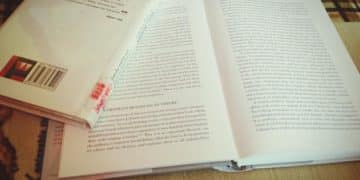Ethical Literary Criticism: Navigating Online Reviews & Author Influence

Ethical considerations for literary critics in the digital age encompass managing authorial influence, ensuring objectivity in online book reviews, and upholding transparency to maintain credibility and reader trust.
The rise of online book reviews and the amplified voice of authors in the digital sphere have significantly reshaped the landscape of literary criticism. Understanding what are the ethical considerations for literary critics in the age of online book reviews and authorial influence is crucial for maintaining integrity and credibility in this evolving field.
Navigating Conflicts of Interest
Literary critics often face potential conflicts of interest that can compromise their objectivity. Transparency and disclosure are key to mitigating these issues and maintaining the trust of readers.
Financial Ties and Publisher Relationships
Critics may receive books for review, payments, or other benefits from publishers or authors. These relationships can create bias, whether consciously or unconsciously, affecting the impartiality of the critique.
Personal Connections and Favors
Personal relationships with authors, editors, or other industry figures can also influence a critic’s judgment. Even unintentional bias can undermine the perceived integrity of the review.
- Disclosure: Always disclose any relationships or financial interests that could be perceived as a conflict of interest.
- Objectivity: Strive for objectivity even when personal connections exist. Focus on the text’s merits and weaknesses.
- Recusal: Consider recusing oneself from reviewing a book if the conflict of interest is too significant to overcome.
Managing conflicts of interest requires diligent self-awareness and a commitment to transparency. By acknowledging potential biases, critics can help readers make informed decisions about their reviews.
The Impact of Authorial Influence on Reviews
Authors have gained considerable influence in the digital age, using social media and other online platforms to promote their work and engage with readers and critics.
Author Interaction and Pressure
Direct interaction between authors and critics can create pressure, influencing the critic’s freedom to express negative opinions. Authors may directly lobby for positive reviews, subtly or explicitly.
Reputation Management and Retaliation
Negative reviews can lead to retaliation from authors or their supporters, impacting the critic’s reputation and access to future works. This fear of retribution can stifle honest criticism.

- Maintaining Independence: Critics must maintain independence by avoiding excessive interaction with authors before writing a review.
- Focus on the Text: Concentrate on the literary merits of the work, not the author’s personality or online presence.
- Constructive Criticism: Offer balanced and constructive feedback, focusing on specific aspects of the text rather than making blanket statements.
Navigating authorial influence requires critics to be assertive in maintaining their independence and focused on delivering honest and well-reasoned evaluations.
Online Book Reviews: Accuracy and Objectivity
The proliferation of online book reviews has democratized literary criticism, but it also raises concerns about accuracy and objectivity. Professional critics must uphold higher standards to differentiate themselves.
The Rise of Amateur Reviews
Platforms like Goodreads and Amazon allow anyone to post a review, which can lead to a wide range of opinions, some of which may not be well-informed or impartial. The lack of professional standards can undermine the credibility of online reviews.
Verifying Information and Sources
Ensuring accuracy is crucial in online reviews. Critics must verify facts, quotes, and other information to avoid spreading misinformation or misrepresenting the work.
- Fact-Checking: Rigorously fact-check all claims made in the review.
- Contextual Understanding: Provide context for the critique, referencing other relevant works and critical perspectives.
- Balanced Perspective: Offer a balanced perspective that acknowledges both strengths and weaknesses of the book.
Maintaining accuracy and offering objective evaluations are essential for establishing credibility in the crowded landscape of online book reviews. Professional critics should serve as reliable guides for readers.
Transparency and Disclosure
Transparency and disclosure are fundamental ethical obligations for literary critics, fostering trust and accountability in their evaluations.
Revealing Review Sources
Critics should disclose how they obtained the book (e.g., from the publisher, purchased independently) to provide transparency about potential biases or influences.
Acknowledging Editorial Influence
Any editorial input or changes made to the review should be acknowledged, particularly if they affect the overall assessment of the work. This maintains transparency about the review process.

- Disclosure Statements: Include clear disclosure statements at the beginning or end of the review.
- Consistency: Maintain consistency in disclosure practices across all reviews.
- Honest Communication: Communicate honestly with readers about potential biases or influences.
By prioritizing transparency and disclosure, critics demonstrate their commitment to ethical practice and build lasting relationships with their audience.
Balancing Critique and Respect
Literary criticism involves evaluating a creative work, which can sometimes necessitate negative comments. Balancing critique with respect is crucial for maintaining professionalism and ethical conduct.
Avoiding Personal Attacks
Critics should focus on the merits and weaknesses of the work itself, avoiding personal attacks on the author. Ad hominem arguments undermine the credibility of the critique.
Constructive Feedback
Provide constructive feedback that offers specific suggestions for improvement. Focus on how the work could be enhanced rather than simply pointing out flaws.
- Respectful Language: Use respectful and professional language, even when conveying negative opinions.
- Focus on the Work: Keep the focus on the text, analyzing its literary elements and themes without resorting to personal commentary.
- Empathy: Consider the author’s intentions and the effort involved in creating the work.
Critics who balance critique with respect foster a more productive dialogue about literature and contribute to a healthier literary community.
Maintaining Integrity in the Digital Age
The digital age presents unique challenges to the integrity of literary criticism. Maintaining ethical standards requires ongoing vigilance and adaptation.
Combating Plagiarism and Misrepresentation
Critics must avoid plagiarism by properly citing sources and giving credit where it is due. Misrepresenting an author’s work or ideas is also unethical and undermines the credibility of the critic.
Adapting to Evolving Standards
Ethical standards in literary criticism may evolve over time. Critics should stay informed about best practices and changing expectations to ensure their work remains ethical and relevant.
- Original Thought: Ensure reviews reflect original thought and analysis rather than simply summarizing or paraphrasing other sources.
- Continuous Learning: Engage in continuous learning and professional development to stay current with ethical standards and critical theory.
- Community Engagement: Participate in discussions within the critical community to address ethical challenges and share best practices.
By maintaining integrity and adapting to evolving standards, literary critics can continue to play a valuable role in shaping literary discourse and guiding readers.
| Key Point | Brief Description |
|---|---|
| 🧐 Managing Conflicts | Transparency is crucial when financial or personal ties exist. |
| ✍️ Author Influence | Maintaining independence amid author interaction is vital. |
| 🌐 Online Reviews | Accuracy and objectivity are key to credible evaluations. |
| 🛡️ Maintaining Integrity | Adapt to evolving standards and address plagiarism issues. |
FAQ
▼
A conflict of interest arises when a critic’s personal or financial relationships could compromise their impartiality, such as receiving payments from publishers or having close ties to authors.
▼
Critics can manage authorial influence by minimizing direct interaction with authors, focusing on the text’s merits rather than personal factors, and maintaining independence in their evaluations.
▼
Transparency is crucial for fostering trust. Critics should disclose how they obtained the book and any potential biases, providing readers with a full understanding of the review context.
▼
Constructive criticism involves offering specific suggestions for improvement, focusing on how the work could be enhanced rather than solely pointing out flaws. It maintains a respectful and professional tone.
▼
Critics can maintain integrity by avoiding plagiarism, properly citing sources, staying informed about ethical standards, and continually adapting to evolving practices in the literary community.
Conclusion
In conclusion, navigating the ethical landscape of literary criticism in the age of online book reviews and authorial influence requires vigilance, transparency, and a commitment to maintaining objectivity. By upholding these principles, critics can continue to offer valuable insights and guidance to readers while preserving the integrity of the literary world.





